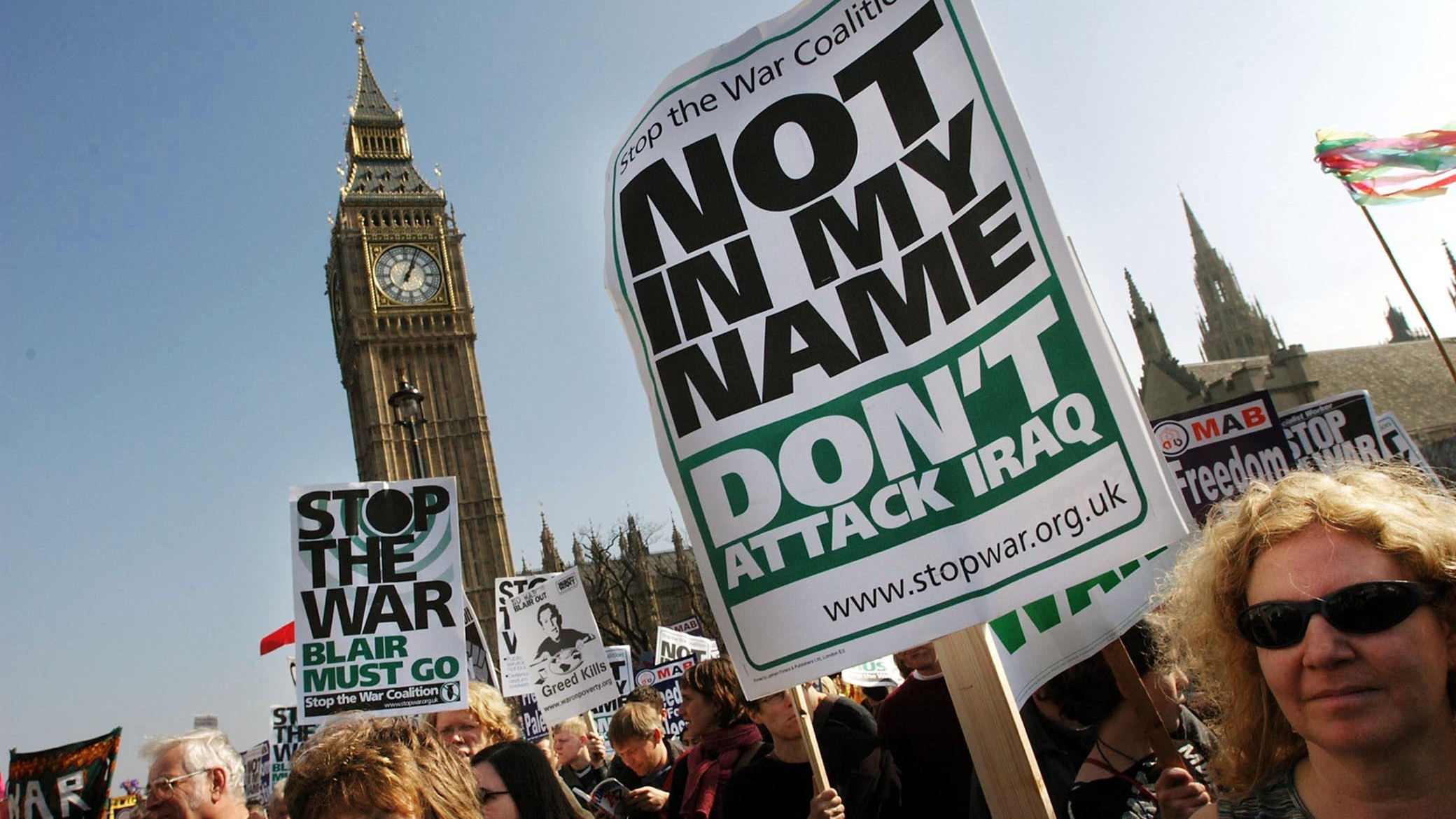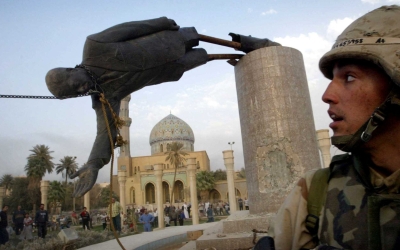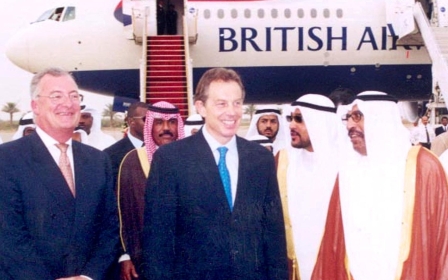Iraq invasion: The unforgettable legacy of Tony Blair

In the heart of Kosovo's capital Pristina lies a road with the curious sounding name of "Toni Bleri".
Wedged between Arberia Park and a host of national embassies, the road was named in honour of former UK Prime Minister Tony Blair.
In 1999, Blair had brought the UK into the conflict then raging between Kosovo and the Federal Republic of Yugoslavia (better known as Serbia and Montenegro), and helped Kosovo's separatists push back Serbian forces and secure autonomy for the region.
Blair would visit Kosovo in 2010 where he was warmly welcomed and introduced to children who had been given the name "Tonibler" in honour of his actions in defending Kosovo Albanians.
"Tony Blair, you, together with our friend President Bill Clinton, carried the torch of the international community for Kosovo’s freedom - therefore, we honour you as a leader and as a hero of Kosovo," said then prime minister - now president - Hashim Thaci as he greeted him.
At the time, American and British intervention in Kosovo had given credence to the principle of "liberal intervention" in foreign conflicts and redeemed much of the international community after inaction led to genocides in Rwanda and Bosnia earlier in the decade.
But just a few years later, in another corner of the Muslim world, the response to western intervention would be starkly different.
Walking down the streets of Basra in southern Iraq, there are no roads bearing Tony Blair's name, nor is there anyone born after 2003 named Tony or Anthony in honour of the leader's actions.
The British occupation of Basra, instead, is remembered primarily for its heavy-handedness, its abuses and the overseeing of the city's descent - along with the rest of the country - into chaos and bloodshed.
Lessons learnt?
The 2003 invasion precipitated a crisis that had ramifications far beyond the borders of the country.
The rise of al-Qaeda from a small cell to an internationally feared fighting force, the birth of the Islamic State group during the US occupation, and the subsequent massacres caused around the globe by both, have been attributed to the fallout of the Iraq invasion.
And the influx of refugees fleeing the carnage in Iraq and its neighbours has become the main talking point of the British government this year, with stopping small boat crossings by refugees across the English channel prompting a raft of draconian legislation that risks violating international law.
John McDonnell, a Labour MP who entered the House of Commons in 1997, has been among a small group of MPs to criticise the government's small boats' bill.
'We're still living in the aftermath of the complete destabilisation of the whole region'
- Ayca Cubukcu, author, For the Love of Humanity
A fierce critic of the Iraq invasion, on 18 March 2003, he received a deeply unparliamentary round of applause after he denounced the proposed invasion as an act of "international vigilantism" and warned it would usher in "unforeseen and incalculable consequences for the world".
The decision to go to war caused a significant rupture within Labour, with Clare Short, the former international development secretary, following Home Office Minister John Denham, Health Minister Lord Hunt and Foreign Secretary Robin Cook in dramatically resigning.
Speaking to Middle East Eye 20 years later, he and his allies had been "tragically proved right".
"I've got 2,400 asylum seekers in hotels in my constituency, and quite a few of them are from Iraq," he explained.
"It just goes on, for decades it just goes on and on, the consequences of the decisions that were made around the war."
He also said it was disappointing how few lessons had been learned.
"I think we were hoping that after Iraq, the lessons of Iraq would be the steering of the hand, if you like, of the rush to war, the rush to military action and to a development of an approach of conflict prevention and conflict resolution before military action takes place," he said.
"And unfortunately, that hasn't happened."
Assessment and verdicts
In 2003, a group of academics, campaigners and public intellectuals set up the World Tribunal on Iraq (WTI) - modelled on the people's court set up by philosopher Bertrand Russell over the war in Vietnam - as a means of assessing the legality of the invasion.
It found that Blair had "misrepresented intelligence" to build a case for war, and had "failed to exhaust all peaceful options" before resorting to military force.
It accused the US and UK, among other things, of "using disproportionate force and indiscriminate weapon systems"; "imposing punishments without charge or trial, including collective punishment" and "redefining torture in violation of international law, to allow use of torture and illegal detentions".
Later reports would be similarly damning - the Chilcot report, issued in 2016 after a six-year inquiry, revealed a memo from Blair to US President George Bush in which he said he “will be with you, whatever” in Iraq, apparently confirmed the report's finding that Blair "chose to join the invasion of Iraq before the peaceful options for disarmament had been exhausted".
"We're still living in the aftermath of the complete destabilisation of the whole region," Ayca Cubukcu, a participant in the WTI and author of For the Love of Humanity: The World Tribunal on Iraq, told MEE.
She added that she found the continued presence of Blair as a respected talking head in the British media and a figure in international conferences "nauseating".
"It says a lot about the political establishments here in the UK that he has managed to rehabilitate his image in the eyes of some but he will forever remain a warmonger and a war criminal," she said.
Blair's doctrine
Blair set out much of his vision for international affairs in a 1999 speech he gave in Chicago, against the backdrop of the Kosovo intervention.
In the speech, titled: Doctrine of the International Community, Blair hit out against the principle of "non-interference", specifically citing Yugoslav President Slobodan Milosevic and Saddam Hussein as destabilising and "dangerous" influences on world affairs.
"We cannot ignore new political ideas in other counties if we want to innovate. We cannot turn our backs on conflicts and the violation of human rights within other countries if we want still to be secure," he told the audience.
Failure to defeat Milosevic in the Balkans meant that the "next dictator to be threatened with military force may well not believe our resolve to carry the threat through".
Nevertheless, he acknowledged the limitations inherent in military action.
"Looking around the world there are many regimes that are undemocratic and engaged in barbarous acts," he explained.
"If we wanted to right every wrong that we see in the modern world then we would do little else than intervene in the affairs of other countries."
Richard Seymour, author of The Liberal Defence of Murder said that Blair's outlook had not fundamentally changed in the years since Iraq and said the basic themes of his 1999 speech still remained: namely that the Atlantic alliance, underpinned by free markets and the security offered by Nato, is the "crux of our freedom".
"Of course, there are mile-wide gaps and contradictions in this ideology," Seymour told MEE.
"But the point about liberalism of this type is that it is morally and intellectually pragmatic enough to tolerate such contradictions, because it is basically vacuous except as an expression of a certain will-to-power."
'Right thing to do'
Blair has over the years made a number of comments on his decision to invade Iraq, acknowledging some of the failures that ensued.
Still, he has maintained that he believed it was the "right thing to do" and has remained steadfast in the belief that Saddam Hussein needed to be toppled.
Many of those who were most persecuted by Saddam's regime, however, have come to view the architects of the war in a less than flattering light.
In 2016, Kadhim Hassan al-Jabouri, a Baghdad shopkeeper who lost more than a dozen relatives to Saddam's brutality - and became famous after being filmed hammering the statue of Saddam in Firdos Square following the invasion - said that Blair should be put on trial for war crimes.
"I wish Saddam would return. He executed many of my family, but he is still better than these politicians and clerics who got Iraq to the way it is," he said, adding that Bush and Blair "must be put to trial as they have ruined Iraq with their lies."
It's a sentiment shared by many Iraqis.
Dhiaa al-Asadi, an academic and former representative of Moqtada al-Sadr, the Iraqi cleric who led an insurgency to drive out foreign forces, said the invasion had been a "disaster".
"The war destroyed the country's infrastructure, which was never repaired, and handed over power to a political class which has set a new internationally recognised standard for corruption," the Basra native said.
"[The invasion] didn't serve the objectives purportedly set out for the campaign: to liberate Iraq, to build or establish a democracy in the region, and to empower Iraq to be a model for the neighbouring countries.
"In fact, Iraq is not considered as a model by Arab countries and is considered a risk, a threat to their existence."
Kamal Jabir, a politician with the secular Civil Democratic Alliance and former freedom fighter against Saddam in the 80s and 90s, was also unequivocal about the impact of the invasion.
"The invasion paved the way for the Islamic parties to rise to power, help Iran swallow Iraq and likewise corrupt and destroy all government institutions, pushing Iraq backward at least 100 years in the aspects of health, education, industry, agriculture, arts, culture, sciences, etcetera," he said
Jabir suggested that without the invasion, Hussein would have faced the same end as many of the region's other autocrats, but with a "better outcome" due to a better organised opposition.
"Saddam's regime was weak regardless of how many lies he and his media were feeding the public about its power," he explained.
He said despite the "stupidity and divisions" that afflicted the various Iraqi opposition parties and groups, they would eventually have been able to organise a movement to oust the strongman.
"Any coordination between Iraqi people inside Iraq and Iraqi opposition groups was going to overthrow Saddam’s regime or at least force him to compromise with the opposition - a much better outcome than the daily hell Iraqis are living in today due to the invasion," he said.
'Effective government'
In the wake of Iraq, the approach that Blair took with regards to the Middle East's other autocrats and presidents-for-life seems to have found him disinclined to ousting tyrants.
Hosni Mubarak, who ruled Egypt for 30 years as a military dictatorship and would later be jailed for the killing of protesters during the Arab Spring was "courageous and a force for good" according to Blair, as late as February 2011.
Blair also favourably viewed Mubarak's successor Abdel Fattah el-Sisi, who has ruled Egypt since he ousted the democratically elected government in 2013, saying the former military chief "should be supported in its reform agenda" and reportedly advising him on a number of issues.
He took a similar position on the other countries affected by the 2011 Arab Spring uprising - far from backing the demands for the overthrow of long-entrenched dictators and the flourishing of democracy, Blair has instead sought to bolster establishment interests.
In 2006, he pressured his attorney general to halt a Serious Fraud Office investigation into allegations that arms company BAE had paid bribes to Saudi princes to win lucrative contracts, warning that "proceeding with the case would result in the end of Saudi-UK cooperation".
'[Blair's] work with regimes with appalling records totally undermines his credibility to be some sort of progressive'
- Chris Doyle, Council for Advancing Arab-British Relations
Later he would reportedly be involved in a $9m deal to advise Saudi Crown Prince Mohammed Bin Salman through his Tony Blair Institute, just months before the killing of Middle East Eye columnist Jamal Khashoggi in the Saudi consulate in Istanbul, an act American intelligence services have ultimately pinned on the kingdom's de-facto ruler.
In 2013, defending the military's role in ousting Egypt's first democratically elected leader Mohamed Morsi, he conceded that he believed "effective government" was at least as important as democracy.
"I suppose he might argue that he wasn't into democracy promotion - there were going to be certain regimes, the likes of Mubarak, who he obviously worked with a lot hadn't been using chemical weapons and committing acts of genocide," Chris Doyle, director of the Council for Advancing Arab-British Relations (Caabu), told MEE.
"But to my mind, yes, I think the way that he went - and not just in the Middle East, but in Central Asia and Africa - and did so much work with regimes with appalling records totally undermines his credibility to be some sort of progressive on this issue."
In 1997, in the wake of the death of Princess Diana, the recently elected Blair could boast a 93 percent approval rating, as he was seen to handle the tragedy with sensitivity and dignity.
By the end of 2003, in the wake of the Iraq invasion and the colossal street demonstrations opposing it, Blair found himself branded the country's "worst Briton" and his reputation never recovered, even as the Labour Party under his leadership went on to score another election victory on top of two already won.
In the years since he left office, Blair has largely faded from public view, outside of an ill-fated stint as Middle East Peace Envoy for the Quartet, and established a number of charities and organisations advising companies and governments for which he has been healthily renumerated, but has faced accusations of potential conflicts of interest.
"When he goes to see Mubarak, does he talk about his business relations or does he talk about, you know, the Egyptian blockade of Gaza, his role in the blockade of Gaza? I mean, how do you square that?” said Doyle.
Rising from the ashes?
In 2015, domestic UK politics was shaken by the election of Jeremy Corbyn as leader of the Labour Party.
Corbyn, who had been a senior figure in the Stop the War Coalition that opposed the Iraq invasion, appeared to stand - in foreign policy terms at least - on the opposite side of the fence from everything Blair did.
The contrast, and the alarm from Blair's former allies at a critic of Nato, foreign military interventions and Atlanticism taking over their party, brought Blair some renewed prominence and reignited questions over his legacy.
In 2016, after Corbyn had suggested Blair could stand trial over the Iraq invasion, Blair hit out at his successor.
"There's a guy whose face is on the placard. That's me: hate that guy. You're the person in power taking difficult decisions. Jeremy is the guy with the placard, he’s the guy holding it. One’s the politics of power and the other’s the politics of protest," he told Bloomberg.
Now, 20 years on, the Labour Party is in the hands of people much more ideologically sympathetic to Blair's legacy.
With polls strongly suggesting the party could win their first election since Blair was at the helm - and with Corbyn suspended from the party whip - current leader Keir Starmer has made uncritical support for Nato a pillar of his foreign policy.
Blair is reportedly back in the tent as well, providing advice to the new leader on his "experience" in government.
And with the war in Ukraine, discussions over the need for countries to overcome a post-Iraq legacy of "non-interference" and act to tackle entrenched despots and threats to the international order are once again on the table - though some have noted the parallels between the Iraq invasion and Putin's invasion of Ukraine.
"We've now entered into another period where memory begins to fade. And therefore people like Tony Blair, because of their access to the establishment, the resources that they have, the major support that they have, they begin to become rehabilitated and therefore able to pronounce and gain the coverage, if not respect, certainly the coverage within certain sections of the media," said McDonnell.
Despite this, he said, he believed that the public at large still understood the need for hesitancy and restraint in the face of conflict.
"I think there's a wariness, a concern about any forms of sort of military adventures that governments want to undertake. And therefore, governments now have to justify themselves a great deal more than they did before Iraq itself."
Middle East Eye delivers independent and unrivalled coverage and analysis of the Middle East, North Africa and beyond. To learn more about republishing this content and the associated fees, please fill out this form. More about MEE can be found here.








